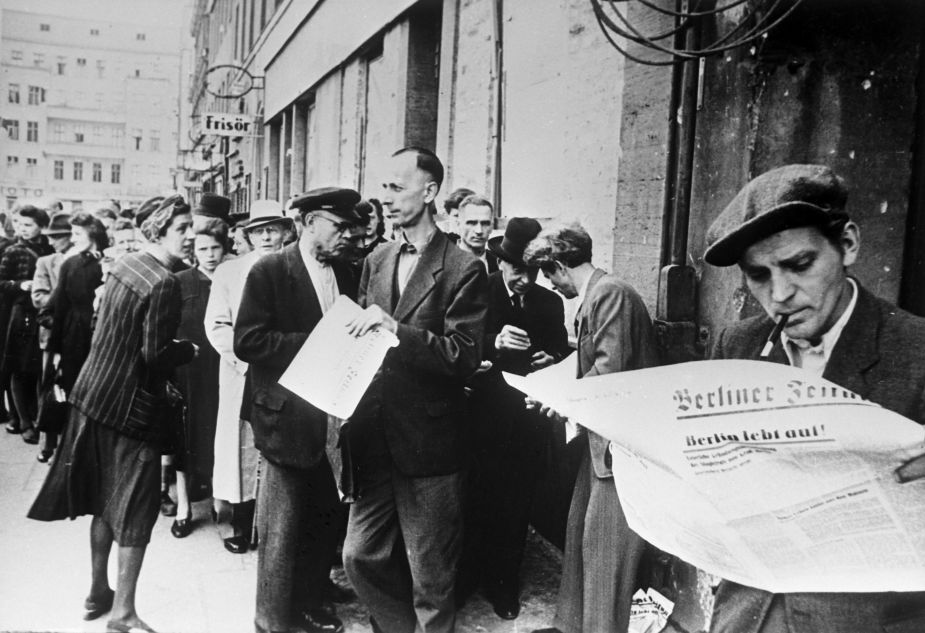The US Army Information Control Division conducted sociological research in the American Zone of Occupation while the tribunal took a break for Christmas and New Year. Its staff tested a hypothesis: were the Germans interested in the Nuremberg Trials?
‘They Want to Dishonour Us’
The survey was conducted by American servicemen and hired German citizens and spanned some 40 towns and villages. Respondents were selected from different social groups: the working class, middle class, and inteligencia. The study showed that the Nuremberg Trials made a stronger impression on people with higher income levels.
The New York Times published some research info.
Are the defendants guilty?
80% – all defendants are guilty
11% – not all defendants are guilty
Which defendant deserves an acquittal?
5% – Rudolf Hess
2% – Franz von Papen
2% – Konstantin von Neurath
1% each – Erich Raeder, Hjalmar Schacht, Karl Dönitz, Wilhelm Keitel, and Albert Speer
(These answers turned out to be fairly perceptive, with the tribunal handing down more lenient sentences to those mentioned above, apart from Keitel).
What was the most important revelation?
29% – the truth about concentration camps
12% – that Nazi Germany was waging a war of aggression
Respondent Kurt Blaum, mayor of Frankfurt-am-Main: “The German people would never have known the truth about the invasion of Poland or the arson of the Reichstag without the trials.”
Respondent Karl Johann Freudenberg, head of the Research Institute for the Chemistry of Wood and Polysaccharides at the University of Heidelberg: “The important thing is that Germans learn what deeds were done in the name of their people by the party leaders. I hope that the coverage of the trial will not cause hatred towards all Germans abroad. University colleagues are interested in the trial, and my wife told me that housewives in the queues never mentioned it even once.”
Respondent Rudolf Falk, an employee at the University of Heidelberg: “Let's take the issue of ‘Neue Zeitung’ from 14 December. There are articles about coal shortages in Germany, German factories starting up again and a news column from various parts of the American Zone of Occupation. These things interest me more than the Nuremberg Trials.”
Respondent Leonie Pretorius, a former lecturer at Heidelberg University: “I can tell from talking to other Germans that in general, the process causes hatred because it is conducted to dishonour Germans who are tried by foreigners.”
The Information Control Division concluded that there was no fundamental change in German attitudes towards the Nuremberg Trials after the proceedings began and the evidence was presented.
The hypothesis of the sociologists was proven correct. The New York Times published an article on the study headlined “WAR-CRIMES TRIAL DULL TO GERMANS; On Eve of Its Resumption Most Cling to Self-Pity Attitude, U.S. Survey Shows”
From Psychological Warfare to Information Control
The Information Control Division was formed on 12 May 1945 as an offshoot of the Psychological Warfare Division of the Supreme Headquarters Allied Expeditionary Force (SHAEF). Its initial task during the war was to demoralise enemy forces and to provide uninterrupted propaganda by air dropping leaflets and radio broadcasts.
US Major General Robert McClure was appointed head of the division.
On Victory Day, 8 May 1945, McClure jubilantly wrote to his wife, Marjory: “(…) We will rigidly control all newspapers, films, theatre, radio music, etc., in Germany! My division now publishes 8 newspapers in Germany with 1,000,000 circulation and sends 2 million+ language papers each day by air for displaced persons and POWs. Biggest newspaper enterprise in the world.”
The division's goals were in line with the course of general denazification: to make Germans condemn Nazism and militarism, push them towards a democratic state, and convince the public to approve of the Allied actions.
Opinion research was a separate branch within the structure of the branch that controlled all of Germany's media. By the summer of 1946, the department was carrying out 15 surveys a month. The survey results highlighting German attitudes to the Nuremberg Trials were used to judge the effectiveness of McClure's department and to adjust the future plan of action for the denazification of Germany.
By Vasilina Vartsaba
Sources:
The New York Times, Vol. XCV, No 32, 120, 2 January 1946
Colonel Alfred H. Paddock Jr. “Major General Robert Alexis McClure: Forgotten Father of US Army Special Warfare”
























